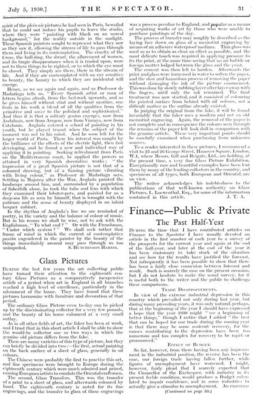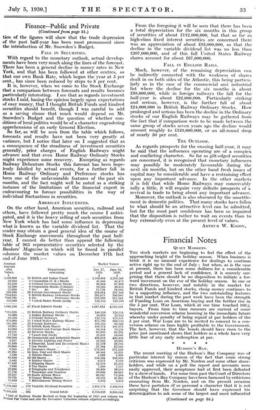Finance—Public & Private
The Past Half-Year
DURING the time that I have contributed articles of Finance to the Spectator I have usually devoted an article in the first number of each year to a survey of the prospects for the current year and again at the end of the half-year, and later at the end of the year it has been customary to take stock of the situation and sec how far the results have justified the forecast. Not infrequently it has been possible to show that there has been a fairly close connexion between 'fotecast and result. Such is scarcely the case on the present occasion, but I do not hesitate to make the usual survey, fur it. is Useful both' to the Writer and the jiublie to challenge these comparisons.
TRADF. DISAPPOINTMENTS, • In view of the extreme industrial depression in this country which prevailed not only during last year, but during many preceding years, it was only natural, perhaps. that at the beginning of the year I should have exPressed a hope that the year 1930 might " see a beginning of better things," though I notice that I added " the best that can be hoped for our trade during the coming year is that there may be some moderate recovery, for the causes contributing to the depression have been too numerous and too complex for recovery to be rapid or pronounced."
EFFECT OF BUDGET.
So far, however, from there having been any improve- ment in the industrial position, the reverse has been the case, our foreign trade having fallen further, while figures of unemployment have worsened. I might, however, fairly plead that I scarcely expected that the Chancellor of the Exchequer, with industry in its present feeble condition, would produce a Budget calcu- lated to impair confidence, and in some industries to actually give a stimulus to unemployment. An examina- (Continued on page 33.)
Finance-Public and Private
(Continued from page 31.)
tion of the figures will show that the trade depression of the past half-year has been most pronounced since the introduction of Mr. Snowden's Budget.
FALL IN SECURITIES.
With regard to the monetary outlook, actual develop- ments have been very much along the lines of the forecast. There has been a general decline in money rates in New York, and that has been followed at other centres, so that our own Bank Rate, which began the year at 5 per cent.,• has since been reduced by steps to 3 per cent.
It is, however, when we come to the Stock Exchange that a comparison between forecasts and results becomes particularly interesting. I see that as regards investment stocks I said, basing the opinion largely upon expectations of easy money, that I thought British Funds and kindred securities should benefit, though I was careful to add as a saving clause that much would depend on Mr. Snowden's Budget and the question of whether con- ditions of local politics would be of a character engendering apprehensions of an early General. Election.
So far, as will be seen from the table which follows, forecasts and results have not been very greatly at variance, but I notice that later on I suggested that as a consequence of the steadiness of investment securities generally, prior charges of English Railways might advance and that even Home Railway Ordinary Stocks might experience some recovery. Excepting as regards Railway Debenture Stocks this forecast has been hope- lessly falsified by actual events, for a further fall in Home Railway Ordinary and Preference stocks has been one of the unfavourable features of the past six months, and the fact might well be noted as a striking instance of the limitations of the financial expert in endeavouring to foresee possibilities in the way of individual fluctuations in securities.
AMERICAN INFLUENCES.
On the other hand, American securities, railroad and others, have followed pretty much the course I antici- pated, and it is the heavy selling of such securities from New York which has had some influence in depressing what is known as the variable dividend list. That the eader may obtain a good general idea of the course of Stock Exchange movements throughout the past half- year, I cannot do better than append the following table of 365 representative securities selected by the Bankers' Magazine in which will be found in parallel columns the market values on December 17th last and of June 19th :-
Nominal Market Values Amount (Par Department, Dec. 17, June 19, Value). containing 1929. 1930'.
3,566,600 58,950 83,550 22,300 21,050 598,230 .254,655 *310,765 132,000
• • •
• • •
• • • • • •
• • •
• •
• • •
• • • • • • • •
• • •
• • • • • • • • • •
• • • •
• • • •
• • • •
• •
• • •
..
.. 10 British and Indian Funds 0 Corporation (U.K.) Stocks 8 Colonial Government Stocks 8 Corporation Stocks (Colonial)
• • • •
7 Do. do. (Foreign)
26 Foreign Government Stocks
6 British Railway Debenture Stocks
6 Do. Preference Stocks 7 United States Bonds (Gold) ..
87 Fixed Interest Stocks
13 British Railway Ordinary Stocks S Indian. Railway Stocks .. 5 Colonial Railways
11 United States Railway Shares .. 20 Foreign Railways.. .. 13 British Bank Shares
18 Colonial and Foreign Bank Shares ..
10 Brewery Stocks .. 7 Canals and Docks 38 Commercial and Industrial Shares ..
8 Electric Lighting and Power .. 9 Financial, Land and Investment Shares 7 Gas Stocks
17 Insurance Shares ..
14 Iron, Coal and Steel Shares
5 Nitrate Shares .. 10 Oil Shares 9 Rubber Shares .. 5 Shipping Shares .. 6 Tea Shares 9 Telegraphs and Telephones 7 Tramways and Omnibus 19 South African Mines ..
6 Copper Mining Shares 7 Miscellaneous Mining Shares
278 Variable Dividend Securities 365 Grand totals .. . 3,166,604 41,588 66,924 19,555 13,728 234,914 185,877 216,309 122,155 £ 3,256,244 43,472 67,609 20,453 14,042 231,149 190,583 211,342 128,330 5,048,100 *315,925 18,900 88,350 474,000 141,200 59,685 43,000 - 18,121 17,750 146,916 9,637 15,100 30,680 9,343 58,294 3,100 42,649 5,402 17,456 1,890 20,808 27,716 29,517 28,795 11,859 *1,635,333 0,683,433 4,067,654 148,356 24,670 132,732 675,760 102,232 188,374 86,584 62,683 25,031 480,013 22,922 21,178 -31,784 170,583 38,584 1,026 156,304 6,871 23,279 7,450 50,408 50,090 80,107 59,321 5,832 4,163,224 124,554 23,182 125,931 608,150 80,546 191,975 79,258 63,305 24,041 442,424 23,003 18,795 32,183 171,428 35,321 1,006 156,929 6,109 21,412 7,137 36,113 50,083 75,200 41,681 5,052 2,652,174 2,444,818 6,719,829 .6,608,042
• List of Railway Stocks Revised as from the beginning of 1923 and column for Normal Par Value and also the December Valurtion column adjusted accordingly.
From the foregoing it will be seen that there has been a total depreciation for the six months in this group of securities of about £112,000,000, but that so far as high-class fixed interest securities are concerned there was an appreciation of about £95,000,000, so that the decline in the variable dividend list was no less than £207,000,000, and of this fall United States Railway shares account for about £67,000,000.
FALL IN ENGLISH RAILS.
Much, however, of the remaining depreciation can be indirectly connected with the weakness of shares dealt in on both sides of the Atlantic, this being particu- larly ,so in the case of the commercial and industrial list where the decline for the six months is about £38,000,000, while in foreign railways the fall for the half-year is about £22,000,000. Particularly striking and serious, however, is the further fall of about £24,000,000 in British Railway Ordinary Stocks. How prolonged and serious has been the decline in the Ordinary stocks of our English Railways may be gathered from the fact that if comparison were to be made between the same group of stocks seven years ago the decline would amount roughly to £120,000,000, or an all-round drop of nearly 50 per cent.
THE OUTLOOK.
As regards prospects for the ensuing half-year, it may be said that the influences operating are of a complex and conflicting character. So far as gilt-edged securities are concerned, it is recognized that monetary influences may possibly be moderately favourable during the next six months, but on the other hand fresh issues of capital may be considerable and have a restraining effect upon any important advance. In the other markets it is felt that while Home Railways may conceivably rally a little, it will require very definite prospects of a revival in trade to bring about any important advance.
Moreover, the outlook is also obscured by the unsettle- ment in domestic politics. That many stocks have fallen to what should be an attractive level can be admitted, but for the most part confidence has been so impaired that the disposition is rather to wait on events than to buy extensively even at the present level of values.
ARTHUR W. KIDDY.











































 Previous page
Previous page